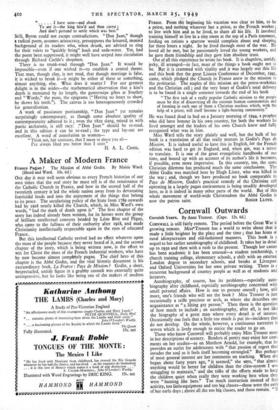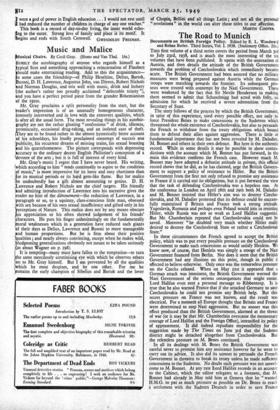Cornwall Outwards
Cornish Years. By Anne Treneer. (Cape. 12s. 6d.)
Coium11.1. is still fairly remote. The period before the Great War it growing remote. Miss"Treneer has a world to write about that ii made a little brighter by the place and the time ; that has hints of rural idiosyncrasies and old-fashioned manners. This book is a sequel to her earlier autobiography of childhood. It takes her in detail up to 1930 and then with a rush to the present. Though her career has been academic it has been unusual—a student teachership, a church training college, elementary schools, a shift with an external London degree to secondary schools, and breaks at Liverpool and Oxford Universities for her own private writing. There is a recurrent background of country people as well as of students and lecturers.
Autobiography, of course, has its' problems—especially auto- biography after childhood, especially autobiography concerned with small personal affairs. How is one to present oneself ; how, still more, one's friends who will see the book ? Miss Treneer is just occasionally a trifle precious or arch, as where she describes one acquaintance as "a lilting gay person." Then there is the question of how much to include ; an autobiography, after all, is not like the biography of a great man where every detail is of interest. Occasionally one feels that a little too much is put in—incidents that do not develop. On the whole, however, a continuous narrative is woven which is lively enough to entice the reader to go on.
Those who know Cornwall will probably enjoy Miss Treneer most in her descriptions of scenery. Readers of poetry may enjoy her com- ments on her studies—as on Matthew Arnold, for example, that he provides an outlet for adolescents with " that passion of regret that invades the soul as it feels itself becoming entangled." But perhaps of most general• interest are her comments on teaching. When she began about forty years ago, " it seemed," she says, " that almost anything would be better for children than the class-system I was struggling to maintain," and she talks of the efforts made to keep the children quiet when really they were working best when they Were " buzzing like bees." Too much instruction instead of free activity, too little-equipment and too big classes—those were the evils of her early days ; above all the too big classes, and these remain. " If were a god of power in English education ... I would not rest until a had reduced the number of children in charge of any one teacher." This book is a record of day-to-day living, the inner world echo- ring to the outer. Strong love of family and place is its motif. It (begins and ends with South Cornwall. GWENDOLEN FREEMAN.















































 Previous page
Previous page